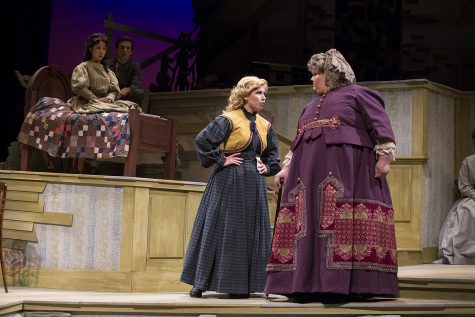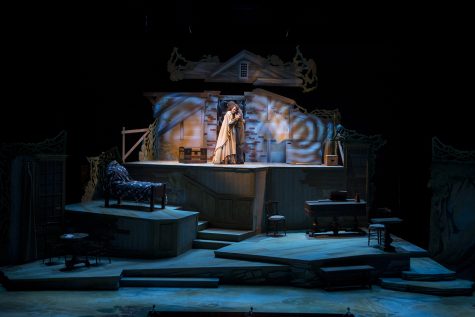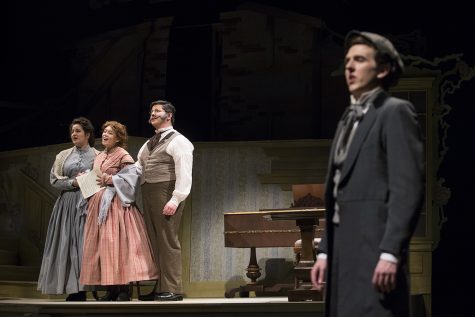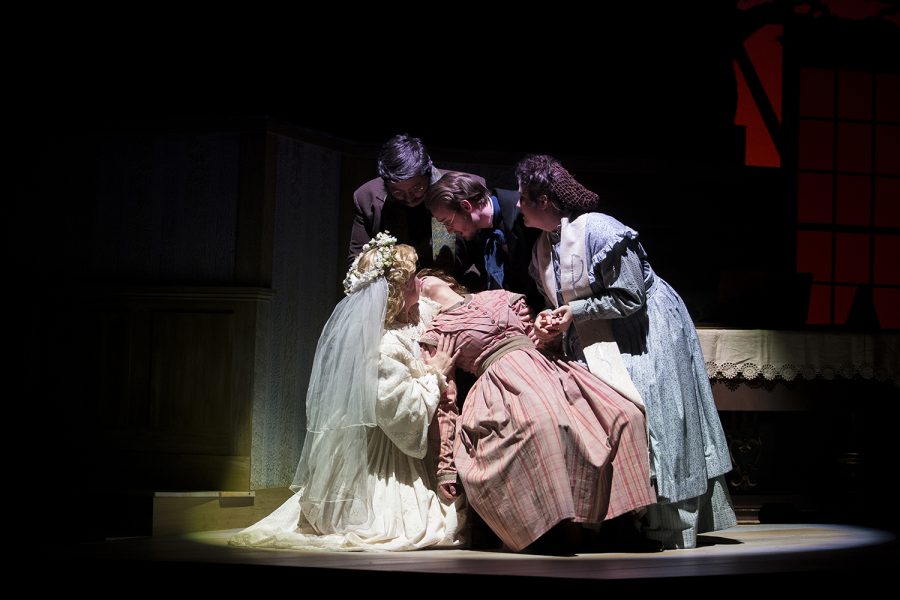Cast perform the wedding scene during a rehearsal for the “Little Women” opera at the Coralville Center for the Performing Arts on Tuesday, April 9, 2019. The opera has showings throughout the weekend of April 12 for audiences to attend.
From the pages of a 19th-century novel to the stage: Little Women, an Opera
Louisa May Alcott’s Little Women was transformed into an opera in 1998. Presented by the University of Iowa School of Music, the opera will open at the Coralville Center for the Performing Arts April 12.
April 10, 2019
How do you take an art form born in the 17th century and give it a modern flair? By throwing in an American classic and four dynamic women, of course.
“Little Women,” a classic American novel written by Louisa May Alcott, follows four sisters growing up during and after the Civil War. The tale struck the hearts of Americans and remains there 150 years later. Numerous film and musical adaptations have been made, but only a single opera adaptation was ever created. In 1998, Little Women Opera came to life through composer Mark Adamo.
The University of Iowa School of Music will present Little Women (Opera) at the Coralville Center for the Performing Arts on Friday through April 14, with shows Friday and Saturday at 7:30 p.m. and a matinee at 2 p.m. April 14.
Needless to say, the arts have enjoyed capturing “Little Women” from varying artistic methods and angles.

Shelby Tipling (left), playing Meg, and Norah Wolfe, playing Cecilia, perform during a rehearsal for the “Little Women” opera at the Coralville Center for the Performing Arts on Tuesday, April 9, 2019. The opera has showings throughout the weekend of April 12 for audiences to attend.
“In a world of drama, Little Women Opera is heightened because of the music,” said Bill Theisen, the director of the production. “For me, the opera adds another layer to the piece. It’s different. Mark Adamo stays very true to the novel, and his take on opera is interesting and successful.”
Unlike a majority of operas, Little Women slides into the contemporary genre and is sung in English, bridging the divide between the old and new.
“Opera is an art form that has often been seen as antiquated and elitist,” said Kelly Hill, who plays Jo March. “But there are still aspects of operatic storytelling that relates to modern times. “Little Women” is a familiar treasure of an American novel, and the opera itself has been written within the past 20 years; therefore, themes that are still relevant are presented in a more modern musical language.”
RELATED: Longest running Broadway musical lights up Hancher
Little Women is a coming-of-age story that shines a light on the challenges, happiness, heartbreak, and change that Meg, Jo, Beth, and Amy March go through after the Civil War. Change, and the negative feelings Jo March has toward the word and what it brings, plays a principal role in the novel and show.
“She is so resistant to the idea of change,” Hill said. “She doesn’t want anyone to infiltrate her family, and it’s hard for her to imagine her sisters being taken away by various suitors. It’s so very human because it’s natural, in many cases, to be resistant to change.”
Jo is the prominent sister of the story because the show is made to seem as though the novel was written by her. Stage lights will shine on the character for Jo since she rarely leaves the stage.
“She’s onstage for the whole opera and very involved in most scenes,” Hill said. “It’s a challenge to stay calm and focused for two acts of vocalizing. It’s very much like a sport because you’re training two tiny muscles in your throat to do something very specific.”
The March sisters have contrasting personalities but are similar because of the love and care they have for one another. Jo is the writer and tomboy of the family but has little control over her temper. Amy March is the youngest daughter and between her siblings, she fulfills the role of an “aspiring artist.”

Cast perform during a rehearsal for the “Little Women” opera at the Coralville Center for the Performing Arts on Tuesday, April 9, 2019. The opera has showings throughout the weekend of April 12 for audiences to attend.
“Amy is an aspiring artist and carries a sketchbook with her all the time,” said Gyehyun Jung, who plays the role of Amy. “She’s artistic and precocious. Young Amy, in Act I, can seem spoiled, but as she matures in Act II, she becomes graceful, smart, and more self-aware. Laurie’s love for her makes Amy humble. She is clever and knows how to get what she wants. When asked what her greatest strength is, Amy replies, ‘My power to persuade.’ It is a pleasure to play such a complex and entertaining character in our production.”
Both sisters clash over their polarizing personalities and societal opinions. Jo and Amy are asked whether they believe marriage is good for a woman, Amy replies with, “I think marriage is the best possible thing for a woman.” Jo exclaims, “I think marriage is the worst possible thing for a woman.” Arguments ensue with peace hopefully on the auditorium’s stage-lit horizon.
RELATED: Canadian Brass brings the holiday season to Hancher
Delving into the March family’s world of the post-Civil War era required more than Alcott’s writing. A set true to its time was constructed into a colonial-style house based on Alcott’s home, as her beloved story’s foundation lies between Alcott and her sisters.
“The scenery is created in the world of Jo’s memory, not just a period space,” said Margaret Wenk-Kuchlbauer, the set designer for the show. “Abstractly, it’s based in her reminiscences of her [Alcott’s] home, childhood, and coming of age.”
While the period of late-1860s, early 1870s is long in the past, the March household is speckled with relatable features.
“Everybody can relate to the notion of “home,” and the details are totally recognizable,” Wenk-Kuchlbauer said. “From the piano to the family quilt and other items, it seems not so different from our memories or keepsakes of today.”

Cast sing during a rehearsal for the “Little Women” opera at the Coralville Center for the Performing Arts on Tuesday, April 9, 2019. The opera has showings throughout the weekend of April 12 for audiences to attend.
In noncontemporary operas, the number of roles available for women were minimal or seldom beckoned for anything other than sopranos. But the novel of “Little Women,” written in times of extensive inequality, now adjusts the rules of the opera game in a modern era.
“In any given opera, the number of roles between men and women is oftentimes unbalanced,” Hill said. “But there are so many character options and narrative perspectives that can be presented by women, which I believe to be important. Opera needs more female perspective.”
Populations of the 21st century receive their entertainment quickly, but that doesn’t mean older novels and art forms are not fit to entertain audiences in 2019.
“We have this modern mentality of going to Marvel movies and having the story and action happen very quickly,” Hill said. “Take a breath and step back, no matter how dry a story might feel, to enjoy something presented at a different pace.”
